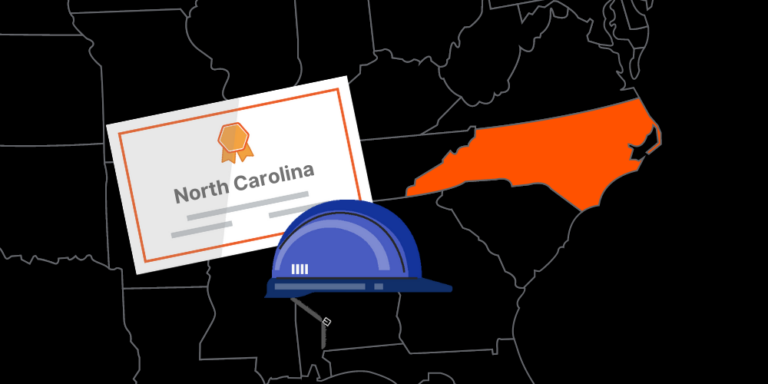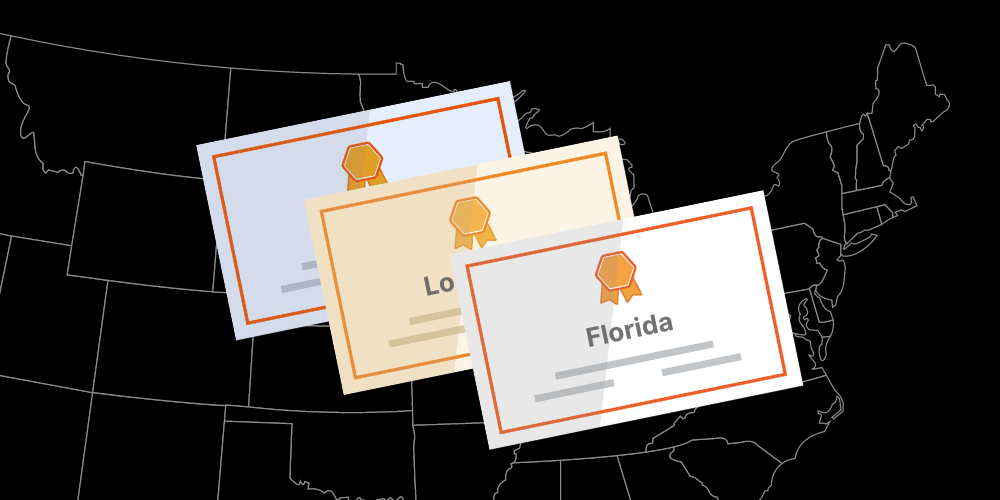— 12 min read
North Carolina Contractor Licensing Guide
Last Updated Nov 16, 2023

North Carolina requires that any general contractors working on contracts in excess of $30,000 obtain a license. Additionally, most specialty contractors also need specialized trade licenses — though in some cases they may need a general contractor's license as well.
The North Carolina Licensing Board for General Contractors(NCLBGC) manages the process for general contractor licenses. If you're starting a construction business in North Carolina, we have all the details you need about choosing the correct license and applying through the state board.
Table of contents
The 5 general contractor classifications in North Carolina
North Carolina has five different types of general contractor license classifications for which you can apply. The following is a brief breakdown of what they are and what types of work qualify for which licenses.
1. Building contractor
The building contractor license covers all building construction and demolition. This includes commercial, industrial, institutional, and all residential building construction.
It also includes projects like parking decks, site work, grading and paving parking lots, driveways, sidewalks, and gutters. Additionally, it applies to contractors building retaining walls or screening walls, indoor and outdoor recreational facilities, running tracks, bleachers, and seating.
If you carry a building contractor’s license, it also covers you for these specialty licenses:
- Concrete
- Insulation
- Interior construction
- Marine construction
- Masonry
- Roofing
- Metal structures
- Swimming pools
- Asbestos
- Wind turbine construction
2. Residential contractor
North Carolina's residential contractor license covers all construction and demolition involved in the construction of residential units built according to the state's Building Code Council building codes.
The residential contractor license covers you for the following specialties as well:
- Insulation
- Interior construction
- Masonry
- Roofing
- Swimming pools
- Asbestos
3. Highway contractor
The highway contractor license covers all highway construction activity — including grading, paving of all types, installation of exterior artificial athletic surfaces, relocation of utility lines, parking decks, sidewalks, curbs, and gutters. It also allows you to construct guard rails, fencing, and signage.
The highway contractor license also allows for airport work. You’ll be able to grade and pave airport and airfield runways, taxiways, and aprons. This license also includes installing fencing, signage, runway lighting, and marking.
The highway contractor license will also cover you for these specialties:
- Boring and tunneling
- Concrete construction
- Marine construction
- Railroad construction
- Grading and excavating
4. Public utilities contractor
The public utilities contractor license covers work on public water and wastewater system projects. Along with those qualifications, this license covers these specialties:
- Boring and tunneling
- Communications
- Fuel distribution
- Electrical (ahead of the point of delivery)
- Water and sewer lines
- Water purification and sewage disposal
- Swimming pools
5. Specialty contractor
Technically, the specialty contractor license is a form of a general contractor’s license. The State of North Carolina does include it under the general contractor licensing subsection. Keep reading for more details.
Stay Ahead & Leave Risk Behind
Manage, baseline, and improve your quality and safety program from your desktop and mobile devices.

Plumbing and electrical licenses
Traditional plumbing and electrical licenses are very different than other licenses in North Carolina. They each have their own licensing board and requirements. Electrical licensing is a function of the North Carolina Board of Examiners of Electrical Contractors. Plumbing licensing falls under the North Carolina State Board of Examiners of Plumbing, Heating, and Fire Sprinkler Contractors.
Both of these types of licenses have education and on-the-job training requirements. They also fall under three tiers: limited, intermediate, and unlimited. Just note that the project value that each tier represents is different for these two trades. Their Boards’ respective websites are the best source of information.
North Carolina specialty contractor classifications
If you’re not planning on contracting directly with a property owner, you can operate your contracting business with a specialty license.
According to NCLBGC Laws and Regulations, as long as you’re working under a general contractor, you can work under one of the following licenses.
Grading and excavating
This specialty license covers digging, moving, and placing materials forming the surface of the earth with hand or power tools and machines — as well as work with earthen dams and the use of explosives used in these activities. It also includes clearing and grubbing, as well as erosion-control activities.
Boring and tunneling
The boring and tunneling license covers the construction of underground or underwater passageways by digging or boring through and under the earth’s surface. It also includes preparation of the ground surfaces at points of ingress or egress.
Communications
A communications specialty license includes the installation of the following:
- All types of pole lines
- Aerial or underground telephone systems
- Aerial or underground distribution for cable TV and master antenna TV systems for transmitting R.F. signals
- Underground conduit and communication cable including fiber optic
- Microwave systems, towers, and cellular phone towers, including the foundations and excavation required
Concrete construction
The concrete construction specialty license covers the construction, demolition, and installation of foundations, precast silos, other concrete tanks or receptacles, prestressed components, and gunite applications.
It does not apply to bridges, streets, sidewalks, curbs, gutters, driveways, parking lots, or highways.
Electrical
A subcontractor with an electrical license has coverage for the construction, installation, alteration, maintenance, or repair of an electrical wiring system. This includes substations intended to be owned, operated, and maintained by an electrical power supplier.
Fuel distribution
A fuel distribution license covers the construction, installation, alteration, maintenance, or repair of systems for distributing petroleum fuels, distillates, natural gas, chemicals, and slurries through a pipeline from one station to another.
It also covers the excavating, trenching, and backfilling involved. The installation, replacement, and removal of above-ground and below-ground fuel storage tanks also qualify.
Water and sewer lines
A contractor with a water and sewer lines license can perform construction work on water and wastewater systems, facilities, and all the site work involved, including grading and paving parking lots, driveways, sidewalks, curbs, and gutters involved in the site.
This license also covers the following specialties:
- Concrete construction
- Insulation
- Interior construction
- Masonry construction
- Roofing
- Metal erection
Insulation
An insulation license allows holding contractors to install, alter, or repair materials classified as insulating media use for the non-mechanical control of temperatures in the construction of residential and commercial buildings. It does not apply to the insulation of mechanical equipment or the associated piping and lines.
Interior construction
The interior construction license covers installing and demolishing acoustical ceilings, load-bearing and non-load-bearing partitions, lathing and plastering, flooring and finishing, interior recreational surfaces, and window and door installations. It also includes the installation of fixtures, cabinets, and millwork. Holding contractors can also remove asbestos and replace it with non-toxic substances.
Marine construction
The marine construction license covers all marine construction and repair work. It includes deep-water work as well as projects in harbors, inlets, sounds, bays, and channels. It covers dredging, construction, and installation of pilings, piers, decks, slips, docks, and bulkheads. It does not include the construction of structures on top of docks, slips, and piers.
Masonry construction
The masonry construction license has a few tiers. They include the demolition and installation of:
- Brick, concrete block, gypsum partition tile, pumice block, or other common masonry materials
- Fire clay products and refractory construction
- Rough cut and dressed stone, marble panels, slate units, structural glazed tile or block, glass brick or block, and solar screen tile or block
Railroad construction
Contractors with railroad construction licenses can build or repair railroad lines. They can also clear and fill right-of-ways. They’re allowed to shape, compact, set, and stabilize road beds.
They’re also able to set ties, tie plates, rails, rail connectors, frogs, switch plates, switches, signal markers, retaining walls, dikes, fences, and gates. This license also includes any tool sheds or platforms required.
Roofing
Licensed roofing contractors can install, demolish, and repair roofs and decks on residential, commercial, industrial, and institutional structures. It includes the use of materials such as:
- Cedar
- Cement
- Asbestos
- Clay tile
- Composite shingles
- All types of metal coverings
- Wood shakes
- Single-ply and built-up roofing
- Protective and reflective roof and deck coatings
- Sheet metal valleys
- Flashing
- Gravel stops
- Gutters and downspouts
- Bituminous waterproofing
Metal erection
The metal erection license includes field fabrication, demolition, erection, repair, and alteration of architectural and structural shapes, plates, tubing, pipes, and bars used as structural members for buildings. It also includes the layout, assembly, and erection by welding, bolting, riveting, or fastening metal products such as:
- Curtain walls
- Tanks of all types
- Hoppers
- Structural members of buildings
- Towers
- Stairs
- Conveyor frames
- Cranes and crane runways
- Canopies
- Carports
- Guard rails
- Signs
- Steel Scaffolding
- Rigging
- Flagpoles
- Fences
- Metal siding
- Bleachers
- Fire escapes
- Stadium, arena, and auditorium seating
Swimming pools
A swimming pool license covers all facets of constructing, demolishing, servicing, and repair of all swimming pools. This includes site work like excavation and grading, construction of concrete, gunite, and plastic-type pools, the decks and walkways that surround them, and all the equipment required to run a pool.
It does not include direct connections to a sanitary sewer system or potable water lines. It also doesn’t include the grounding and bonding of any metal surfaces or tying the pool to the electrical service.
Asbestos
The asbestos license has a caveat. A contractor does not need a license for contracts under $30,000. But, if the contract exceeds that $30,000 benchmark, a licensed contractor can renovate, demolish, repair, maintain, remove, isolate, encapsulate, or enclose Regulated Asbestos Containing Materials. They can work in any commercial, industrial, or institutional building, whether public or private.
The 3 North Carolina contractor licensing tiers
Beyond the different types of general contractor licenses, there are also three licensing tiers in North Carolina.
1. Limited license
Contractors holding limited licenses can act as general contractors for any single project with a value of up to $500,000, excluding the cost of the land and ancillary costs to improve the land.
These contractors must have current assets that exceed the total current liabilities by at least $17,000 or have a total net worth of at least $80,000. They can also provide proof of a $175,000 surety bond instead.
2. Intermediate license
Contractors holding intermediate licenses can act as general contractors for any single project with a value of up to $1,000,000. Again, this excludes the cost of the land and ancillary costs to improve the land.
Intermediate-level licensees need to have current assets that exceed the total current liabilities by at least $75,000. If that’s not possible, they can provide proof of a $500,000 surety bond instead.
3. Unlimited license
There are no restrictions on the value of single projects for contractors with unlimited licenses. However, they must have current assets that exceed the total current liabilities by at least $150,000. They can also secure a $1,000,000 surety bond instead.
How to get a contractor license in North Carolina
Once you have a license type and tier in mind, you’re ready to start the North Carolina contractor licensing application process. In general, applicants need to be 18 years old, be of "good moral character," and provide proof of the financial requirements or surety bond.
Requirements for each individual license and tier vary, but there are some general requirements: You’ll have to prove you registered your business with the NC Secretary of state, provide a financial statement that proves you’re in good financial standing, and pay the application fee. The limited license application fee is $75, the intermediate license fee is $100, and the unlimited license fee is $125.
After compiling all the necessary documentation and completing your application, you need to mail it to the North Carolina Licensing Board for General Contractors. The NCLBGC states the steps for the application process are as follows:
- Mail the application to the NCLBGC
- The Board reviews the application for completeness and compliance
- The Board will contact you via email if more information is necessary
- Once the application meets the requirements, the Board sends an exam eligibility letter
- Schedule and take your exam
- Once you pass, the Board conducts a final review and approval
- Upon final approval, the Board grants a license
License renewal requirements
Once you have a license, it expires on the first day of January each year.
North Carolina wants to ensure that you’re sticking to the financial responsibility guidelines, so along with your renewal application, you’ll have to include evidence of your bonds or assets.
Renewal fees also apply:
- Unlimited license renewal fee: $125
- Intermediate license renewal fee: $100
- Limited license renewal fee: $75
If your renewal application is late, there is a $10 fee for each month after January. If you let it lapse for four years, you’ll have to start the process over as a new applicant.
North Carolina licensing penalties
The penalties for contracting without an appropriate license in North Carolina can be severe.
Contracting without a license is a Class 2 Misdemeanor in North Carolina. So is impersonating a contractor, or an engineer or architect recommending the award of a contract to an unlicensed contractor. The NCLBGC can also apply for an injunction, barring the contractor from continuing to work in that capacity until the issue sees a resolution.
There’s also the strong possibility of stiff fines, fees, and reparations. And, as mentioned above, unlicensed contractors performing work for which the state requires a license cannot file a breach of contract against the customer. Even if the work is top-notch, the contractor might not have a leg to stand on.
North Carolina imposes no specific licensing requirement in order to file a valid mechanics lien. So, if you’re a contractor performing work that normally requires a license, but you don’t hold that license, you can file a mechanics lien. However, you cannot sue the other party for a breach of contract.
Regardless, it is never a good idea to perform work for which a license is a requirement without having the proper license.
Categories:
Tags:
Written by
Tom Scalisi
57 articles
Tom Scalisi is a writer with over 15 years of experience in the trades. He is passionate about educating contractors and specialty contractors about the best practices in the industry. He has seen first-hand how education, communication, and preparation help construction professionals overcome challenges to build a strong career and thriving business in the industry.
View profileWin More Work
Get discovered for relevant work on the Procore Construction Network.

Explore more helpful resources

Contractor License Bonds: Everything You Need to Know
In order to perform construction work, many states require contractors to be “licensed and bonded.” What does that mean? Well, every state sets its own rules for contractor licensing, and...

Contractor’s Guide to License Reciprocity: Working Across State Lines
For many contractors, growing a construction business means taking on jobs in different states. Whether it’s to take a one-off project or to establish a new business location, working in...

Vermont Contractor License: Guide to Rules & Requirements
If you’re starting a construction business in Vermont or looking to expand your business from another state, being properly licensed to work is one of the first key steps. There...

The Maine Contractor License: Guide to Rules & Requirements
If you’re considering starting a contracting business in Maine, it’s important to know the rules and requirements for proper licensing. Maine takes a different approach to contractor licensing than most...
